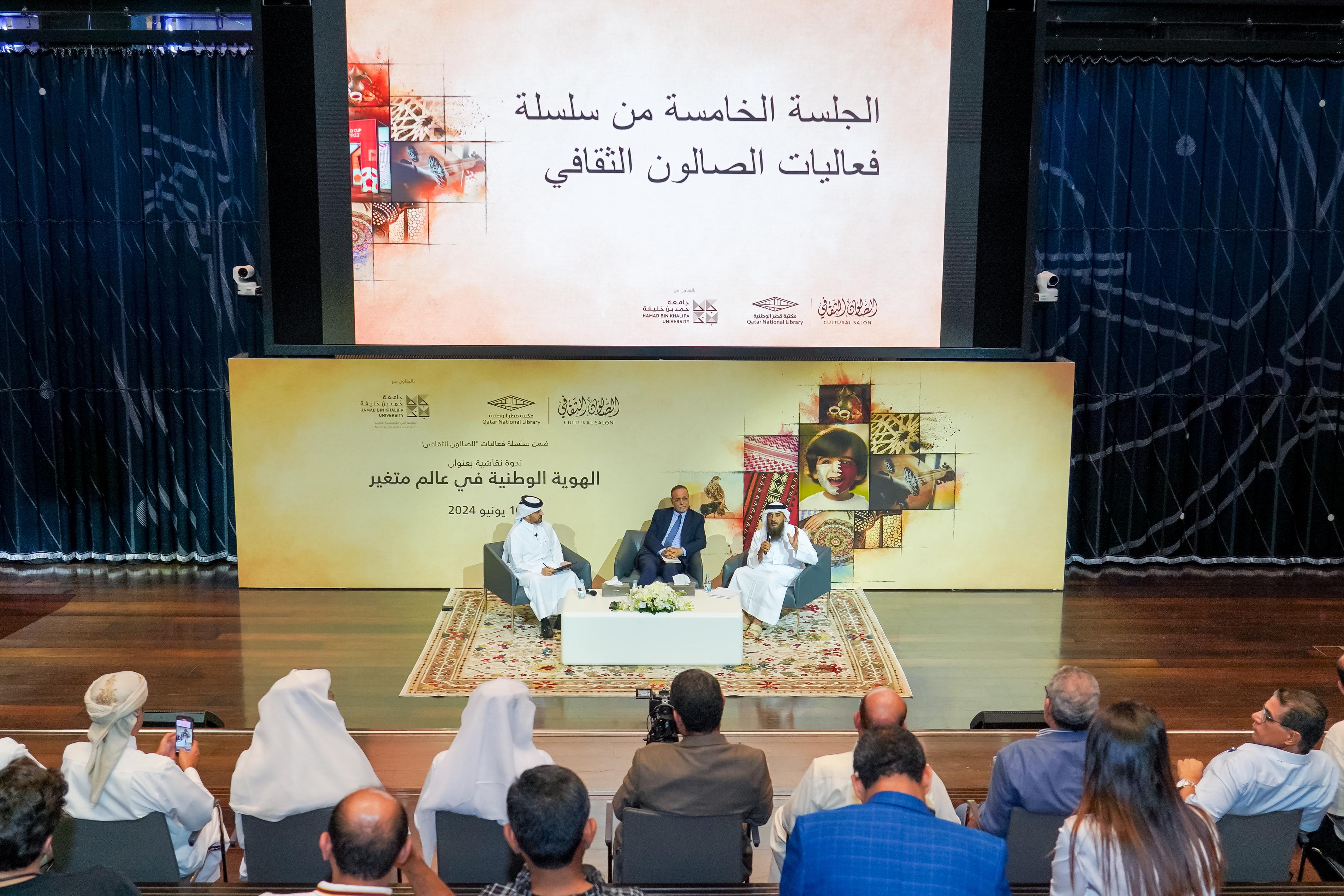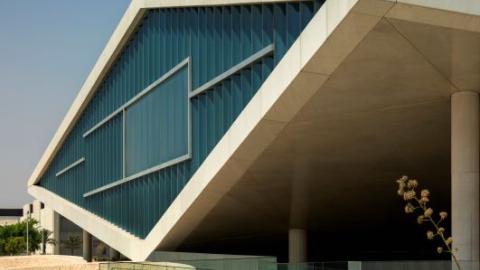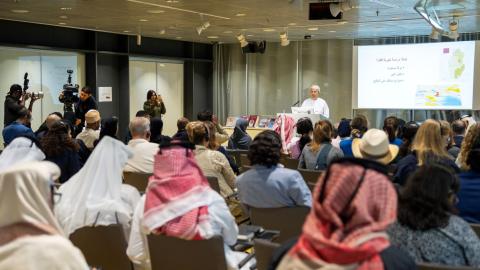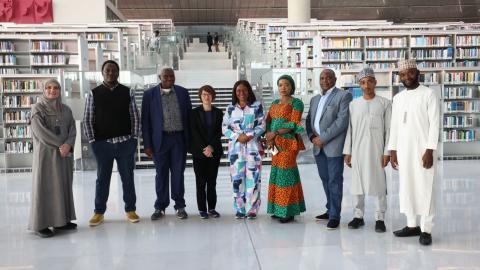
In the latest episode of its Cultural Salon series, Qatar National Library delved into the multifaceted aspects of national identity in an increasingly interconnected and globalized world.
Titled “National Identity in a Changing World,” the session provided insights into the dynamic nature of national identity amid the 21st century’s shifts in demographics, and accelerating economic, cultural, and technological transformations.
The session highlighted that the national identity has become increasingly complex and contested. As distances shrink, demographics shift, and economic, cultural, and technological transformations accelerate, national identities face mounting pressures, leading to new challenges and conflicts. Navigating these complexities requires a thoughtful examination of identity from within, one that acknowledges the evolving nature of belonging and the need for a nuanced understanding of identity's role in shaping individuals, communities, and nations.
His Excellency Mr. Khalid bin Ghanim Al-Maadheed, a member of the Shura Council, and Dr. Ezzeddine Abdelmoula, Manager of Research at Al Jazeera Center for Studies, explored the complexities of national identity and how individuals and societies can adapt, thrive, and maintain their unique identities in a dynamic global landscape.
Navigating these complexities, they argued, requires a nuanced understanding of identity's role in shaping individuals, communities, and nations, and a thoughtful examination of the evolving nature of belonging.
H.E. Al-Maadheed touched on the various definitions of identity, emphasizing its role as a distinguishing trait of an individual or group. He elaborated on the foundations and various layers of identity, as well as the interconnections between its visible and underlying components. Visible components include dress, architecture, and language as opposed to the underlying components of shared history and societal, religious and humanitarian values, H.E. explained.
"The Zionist war on Gaza and the unequivocal Western support for the occupying state have revealed a profound identity crisis within the Arab and Islamic world, evident in the fragmented and diverse reactions on various levels. This crisis stems from multiple factors, including the influence of social media, deficiencies in social upbringing, and fascination with Western modernity."
H.E. further noted, "The State of Qatar places significant emphasis on the issue of national identity, as demonstrated by the extensive and dedicated efforts of the Ministries of Culture, Education, and Endowments. The family plays a crucial role, and intellectuals must actively tackle community issues. Building a collective memory and prioritizing the Arabic language in the workplace and across schools is essential. Media must play an active role in instilling moderate national identity values that honor heritage and promote engagement based on rationality and wisdom."
Dr. Abdelmoula, on the other hand, emphasized that the issue of identity is as old as history itself, tracing back to the philosopher Aristotle, who sought to formulate the principles of logic and sound thinking. The first principle he identified was the principle of identity, which asserts that a thing is identical to itself, he explained.
"National identity is a central link in a chain of multiple identities, starting with one’s individual identity, family and community identity, state identity, regional identity (such as Gulf identity), national identity (Arab and Islamic identity), and finally human identity. This human identity motivates university students in Europe and America to support Gaza in facing the brutal Zionist aggression," he noted.
Dr. Abdelmoula also highlighted the pivotal role of education in defining one’s identity. "In Qatar, as in other countries, the educational institution is one of the most important societal pillars where the features of national identity take shape. It is in the context of such institutions that youth learn their history, gain knowledge of their heritage, and strengthen their connection to unifying values. The national language serves as a carrier of these values which are then passed from generation to generation in a changing internal and external environment."
His Excellency Dr. Hamad bin Abdulaziz Al-Kawari, Minister of State and President of Qatar National Library, said the Cultural Salon series and the intellectual questions it raises have enriched Qatar’s cultural landscape.
“These conversations underscore Qatar National Library’s role as a platform for the community to express its interests and concerns and strengthen the Library’s position as a center of reading and learning and as an institution that spearheads efforts to preserve the cultural heritage of Qatar and the region,” Dr. AL-Kawari said.
“Our Cultural Salon has become a well-established platform for constructive dialogue on cultural and intellectual issues that impact our society. The past sessions featured rich discussions that left a clear imprint on the Qatari cultural scene. In today’s session, we addressed an issue of great importance, which is preserving one’s national identity in the era of globalization, with all its momentum, complexities, and technological developments.”
His Excellency Dr. Al-Kawari said the world’s increasing interconnectedness driven by the telecoms revolution leaves no room for doubt that the traditional notion of national identity faces challenges.
“Local cultures have become like small streams or rivers that have difficulty maintaining their flow in the face of the sweeping flood of globalization. Amidst these changes, the Cultural Salon seeks to promote learning and cultural exchange, and the wise belief that openness to various cultures in the 21st century does not conflict with preserving the dimensions of national identity and adhering to our values, heritage, and linguistic, cultural, and spiritual traditions.”
The event marked the fifth instalment in the Cultural Salon series, which has featured – since the launch of the assault on Gaza – several events to raise awareness about the Palestinian cause and its deep-rooted Arab identity.
The Cultural Salon was launched with the aim of creating an open public space that promotes dialogue, enriches culture and raises public awareness.
For a complete list of all QNL events, please visit the Library’s website (www.qnl.qa/en/events) or the QNL mobile app, which is available globally to download for free from the App Store on iOS devices and Google Play for Android.







